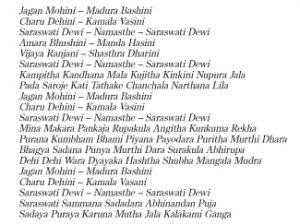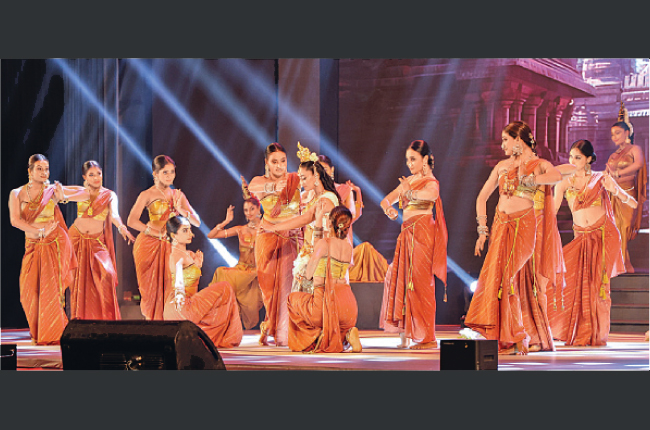 Five decades back, a writer composed an anthem in honour of Goddess Sarasvathi.
Five decades back, a writer composed an anthem in honour of Goddess Sarasvathi.
Since Chandraratne Manawasinghe penned the anthem in 1964, hardly a cultural ceremony goes by without the Sarasvathi anthem. For those of us with a penchant for tradition, every moment of those three to four minutes is cherished, from Maestro Amaradeva’s melodious rendition to the graceful movements of the female dance troupe, symbolising a blossoming lotus.
In 1964, the Sarasaviya Film Awards were held for the first time, marking the launch of the Saraswathi tribute song. In an article, Chanda Daya Siriwardena elucidates the genesis of this composition.
Song composition
 Siriwardene recounts this historical episode based on the firsthand experience of Professor R. A. D. Gunaratne, who served as a journalist at the Sarasaviya editorial, closely collaborating with Chandraratne Manawasinghe and the newspaper’s editor, Wimalasiri Perera. Editor Perera, also the ex-officio chief organiser of the film festival, approached Manawasinghe with the task of composing a song for the Sarasaviya Film Festival.
Siriwardene recounts this historical episode based on the firsthand experience of Professor R. A. D. Gunaratne, who served as a journalist at the Sarasaviya editorial, closely collaborating with Chandraratne Manawasinghe and the newspaper’s editor, Wimalasiri Perera. Editor Perera, also the ex-officio chief organiser of the film festival, approached Manawasinghe with the task of composing a song for the Sarasaviya Film Festival.
Siriwardene writes Professor Gunaratne’s memories:
“Perera and I visited Manawasinghe at his residence. Despite his ill health, Manawasinghe didn’t want to turn down Perera’s request. He dedicated a couple of hours, disregarding his physical condition. During our conversation, Manawasinghe spontaneously penned a few lines on a piece of paper. Shortly after, he handed it to Perera. However, Manawasinghe had his own condition—he insisted on Amaradeva composing the melody and lending his voice to the song.”
He said, “Wimalasiri, I’ve honoured your request. Now, honour mine.”
The rest, as they say, is history, and we are captivated by Amaradeva’s melodious voice. Interestingly, at the festival itself, both Manawasinghe and Amaradeva received awards. Manawasinghe was honoured with the award for the best song (Paramitha bala pooritha poojitha), while Amaradeva was recognised for his music in Gamperaliya.
The song opens as follows:
Jagan mohini madhura bhashini
Charu dehini kamala wasini
Saraswathi devi vande sarasvathi devi…
I wish I could have translated this beautiful song into a loose English rendition at least, but forgive my limitations; given that it’s written in Classical Sinhalese closely resembling Sanskrit. Translating such a lengthy song would require skills beyond my command.
I’ve managed to write something that goes like this. Please regard it not as a translation, but merely my interpretation of Manawasinghe’s opening verse.
In a world charmed by your grace,
Your pleasant speech a soothing embrace.
With a figure so beautiful, like a lotus serene,
In your presence, every moment feels pristine.
To you, Muse, I clasp my hands in humble prayer,
Range of expressions
In contrast to many classical compositions where monotonous tone is a unique character, this song diverges, embracing a range of expressions. Amaradeva modulates his voice, purposefully accentuating particular sections while subtly attenuating others. This deliberate variation aims to heighten the emotional resonance of the music, guiding us through a nuanced journey of sound and sentiment. Through strategic shifts in emphasis and tone, Amaradeva’s composition captivates the audience. His voice offers interpretations to the Sinhalised Sanskrit words which are generally obscure.
Manawasinghe’s artistic vision transcends conventional boundaries, integrating elements of academia, music, and visual art within the composition. He roams different realms, weaving creativity that shun categorisation.
Five decades into the spotlight, the Sarasaviya Film Festival can reflect with satisfaction on the legacy left by two legendary figures who graced its debut stage. Manawasinghe and Amaradeva formed a symbiotic relationship. They enriched each other’s artistry. Amaradeva lent his exquisite and profoundly resonant voice to Manawasinghe’s lyrical compositions, infusing them with a soul-stirring melody. Conversely, Manawasinghe provided Amaradeva with meaningful lyrics to breathe life into through song.
Yet, some may argue that Manawasinghe’s reliance on obscure vocabulary limited his impact. They may suggest that he didn’t fully deliver on the promise of his words. However, this perspective overlooks the layers of meaning woven into his compositions, which often require deeper contemplation to fully appreciate. Manawasinghe’s choice of words, though sometimes esoteric, added richness and depth to his collaborations with Amaradeva. That choice of words and style elevated their collective work to timeless heights.
Indeed, the use of obscure words serves not only to showcase scholarship but also to convey precise meanings that may not be adequately captured by more common terms. For instance, words like “give,” “offer,” and “provide” may appear similar at first glance. Yet, each word carries distinct connotations and implications. “Give” suggests the act of transferring possession or control of something to another party, often without expectation of return. “Offer,” on the other hand, implies presenting something for consideration or acceptance. “Provide” denotes furnishing or supplying something that is needed or desired, implying a sense of reliability and assurance in meeting a requirement or fulfilling a request. This deliberate choice of vocabulary allows for clarity.
Sachitra Mahendra






